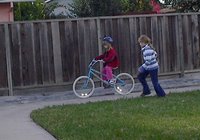(Simon Vouet, French, 1590 - 1649detail of Calliope fromThe Muses Urania and Calliope, c. 1634, oil on panel, Samuel H. Kress Collection)
Carolyn of Guilt-Free Homeschooling answers questions from a first time homeschooler embarking on this heroic endeavor. In another epic adventure, Anne of PalmTree Pundit writes about the silver lining during discouraging times. Tenniel for SCHOOL@HOME blogs about risk taking and learning to fly. Homeschool Mami explains how speaking two languages at home gives her children great eloquence.
Clio, the Muse of HistoryDetail from 'The Allegory of Painting' by Vermeer Kunsthistorisches Museum, Vienna
Steve at the Dad's Corner reveals a little history about American coins the he learned from a tour at the Denver Mint. Janine at Why Homeschool shares why the history that we have with our family matters so much.
(By Filippino Lippi. Allegory of Music (The Muse Erato). 1504. Tempera on panel. Gemaldegalerie, Berlin, Germany.)
Mimicry can be a good thing. Beverly at About Homeschooling shares printable pages and a photo gallery to help homeschoolers learn about Maple Sugaring. Queen of Carrots of Introducing the World shares fun activities with pictures. And moving on to poetry, Bruggie Tales shares a poem "I Stitch, you stitch, we all stitch." Sweetness and Light gives us a list of the reasons she loves to homeschool.
Laurent de la Hyre : La Muse Euterpe, 1648 painted by painted by Camiile Roqueplan.
Mrs. Happy Housewife describes how folk songs are a favorite part of their homeschooling.
Elisabetta Sirani (Italian, 1638-1665) Melpomene, The Muse of Tragedyn.d.Oil on canvas, 34 1/4 x 28 in.
Steve Braun, husband of Spunky, debates what he regards as a tragedy in the Christian homeschooling community, the endorsement of Robert Kiyosaki's Rich Dad Poor Dad. Captain Mom discusses the tragedy of pushing academics too early and the harm of expecting all children to develop at the same rate. Trivium Pursuit details the tragedy of socialization at public school.
K20.10 "The Nine Muses"Roman Mosaic, Vichten C3rd ADLuxembourg City, NationalMuseum of History and Art
Spunky at SpunkyHomeSchool shares her own sacred poetry, The Ten Commandments for Christian Homeschooling Moms. Amy at DANDELION SEEDS explains the principle of PUSH (Pray Until Something Happens).
Eustache Le Sueur - The Muse Terpsichore (1652-55), Oil on panel, 116 x 74 cmMusée du Louvre, Paris
I'm sure many homeschoolers can relate to that "whirler" feeling. Christine at The Thinking Mother explains that delicate dance with do when networking with other homeschoolers. Melissa at Home Sweet Home talks about another delicate dance, how we decide how many extra-curricular activities is too much. Twice Bloomed Wisteria takes on the difficult question: How much is enough?
Seated muse, Thalia (Roman, 2nd century A.D. - Hadrianic period)
Dr. Helen comments on an article in the Washington Post with reference to replacing the Gifted program in Montgomery County, Maryland. We weren't sure whether to put this under comedy or tragedy. Patricia at Pollywog Creek Porch shares how Grandma's comments while studying Shakespeare sometimes made her smile. One Sixteenth contemplates mummifying a chicken as they study ancient Egypt.
Simon Vouet, French, 1590 - 1649detail of Calliope fromThe Muses Urania and Calliope, c. 1634, oil on panel, Samuel H. Kress Collection
Dana at Principled Discovery discusses why it is important to look to a heavenly standard when we struggle with mixed motives in our homeschooling.
If you have enjoyed the Carnival of Homeschooling, please spread the word.
If you missed the previous carnivals, click here for the archives.
Next week the carnival will be held at PalmTree Pundit. If you are interested in submitting a post, click here for information.
If you have some constructive suggestions on how to improve this carnival, please leave a comment.
For those interested, the Carnival of Education will be coming out on Wednesday.
This carnival is registered at TTLB's Uber Carnival.
I'd like to thank everyone who has helped out. Thank you to all the participants in this carnival. And thanks to all those who have helped publicized the Carnival of Homeschooling.
----------
Technorati tags: homeschooling, homeschool, home school, home education, parenting, children, education, teaching, politics, books, muse, Calliope, Clio, Erato, Euterpe, Melopomene, Polyhymnia, Terpsichore, Thalia, Urania
